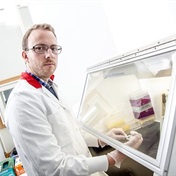Ten international drug companies are to team up with scientists from 11 European countries to create a bank of stem cells for a project aimed at speeding up the development of new medicines.
StemBANCC, coordinated by Swiss drug maker Roche and managed by scientists at Oxford University, aims to use human-induced pluripotent stem cells - derived from people with hard-to-treat conditions - as research tools.
Martin Graf from Roche, who is coordinating the project, said the goal was to generate 1 500 induced pluripotent stem cell lines derived from 500 patients that can then be used by researchers around the world to study a range of diseases, including diabetes and dementia.
In recent years, researchers have developed a way of reprogramming ordinary adult cells taken from skin or blood, for example, to turn them into stem cells that can be used to generate almost any type of cell.
These induced stem cells can offer a supply of different kinds of human cell such as cardiomyocytes and neurons that can be used for a broad range of laboratory tests in early-stage drug development.
The research that led to the creation of the first induced pluripotent stem cells was a significant breakthrough that won the scientists behind it - John Gurdon and Shinya Yamanaka - this year's Nobel Prize for Medicine.
How the study will be done
Graf and Zameel Cader of Oxford University, who announced the project in London, said the raw material for the project would be largely skin and blood samples taken from patients with diseases such as Alzheimer's and diabetes.
The research will focus mainly on these conditions as well as peripheral nervous system disorders such as chronic and neuropathic pain, central nervous system disorders such as dementia and neurodysfunctional conditions such as autism, schizophrenia and bipolar disorder.
Cader said that because the stem cell bank's cell lines will be derived directly from real patients, the lines will include the genes that may be the culprits in causing the diseases to develop, which will make the cells useful for testing the efficacy and toxicity of potential new medicines.
"This is essentially what is so transformative about (induced pluripotent) stem cell technology - for the first time you can get at the cells that are relevant from the patients with the conditions," he said. "That is what is so exciting about it."
The project is a public-private partnership backed by the European Union's Innovation Medicines Initiative and is half funded by the drug industry and half by the EU.
Other drug makers involved are Abbott, Boehringer Ingelheim, Eli Lilly, Janssen, Merck KgaA, Novo Nordisk, Orion, Pfizer and Sanofi.
(Reuters Health, December 2012)
Read More:




 Publications
Publications
 Partners
Partners














